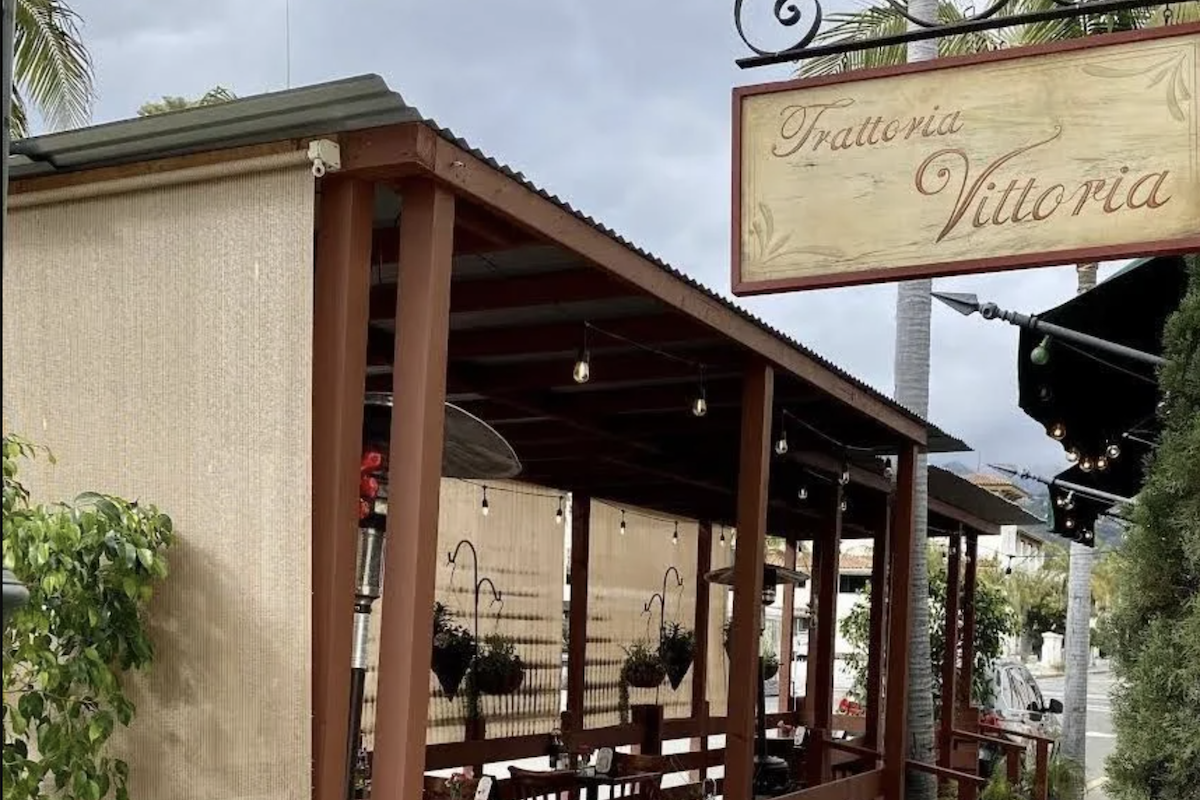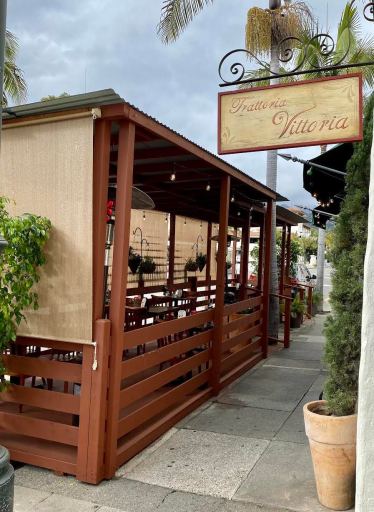Keep the Parklets on Santa Barbara’s Side Streets
Restaurants' Parklets Are Safer for the Disabled and Immunocompromised Community

My name is Vittoria Comin. I am the namesake and manager of Trattoria Vittoria, a small Italian restaurant on Victoria Street owned by my nonno since 2006. As one of the many restaurants painted in a callous light as a result of this incident with the parklets being forcibly removed, I felt it prudent and appropriate to speak to the issue in a public format.
It is admittedly a rather bizarre experience for me — I usually hear complaints from my family that I am overly liberal — to be writing about unreasonable ADA [Americans with Disabilities Act] compliance requirements. However, I think this is a prime example of how local government and bureaucracy undermines the true spirit of accessibility and equal treatment by virtue-signaling on issues like these and taking actions that seem purely performative, without actually addressing any problems.

I would like to start by clarifying that our parklet, along with many other long-standing local businesses, like Ca’Dario’s across the street from us, is fully compliant and has been acknowledged by the city to be compliant. They are forcing us to remove the parklets anyway, since we were unable to make them compliant within the unreasonable timeframe given to us and lack of proper noticing. We had gone ahead with the thousands of dollars of repairs we had scheduled in good faith, even after we received the removal notice. We believed the city would be reasonable about the fact we were simply unable to get anything scheduled sooner. From the time we had actually received our notice, damage from recent storms made local carpenters’ time very limited, plus the fact that every other parklet on the same timeline was attempting to book these same carpenters for many of the same repairs as Trattoria Vittoria. As you know, “reasonable” could not be further from what has happened.
I will admit I am a bit cynical when any politician claims to be acting out of concern for their “moral authority,” but I ask how on earth it can be considered to be in the spirit of accessibility to force the removal of parklets, which are fully compliant and safe, that enable us to accommodate the portion of the disabled community that is immunocompromised?
Our restaurant will no longer be able to offer safer outdoor dining to immunocompromised people, despite being a fully compliant unit. Fundamentally, I believe the City Council just does not want to keep parklets (at least the ones that are not on the State Street Promenade) and is not prepared to reckon with the level to which the city’s restaurant businesses have come to rely on these parklets — our state and city have increasingly unreasonable cost of living and inflation issues, and our industry has increasingly smaller margins. Nor does the city understand the level of demand there is for parklets among the citizens, or the fact that outdoor dining is itself an accommodation that any immunocompromised diner should be entitled to.
However, while it is a can of worms the city is not yet prepared to open, it will soon have no choice as it is attempting to preemptively cut off many parklets’ existence by removing them due to “non-compliance” with ADA requirements, with tight deadlines and back-handed noticing practices. The difference in care shown to our tiny, locally owned family restaurant, in comparison to the level of hand-holding and accommodation given to the parklets on State Street, is blatant. Not to mention that the “Service of Process” notices given to the restaurants in questions were not sent to the Service of Process address on file with the Secretary of State. Such legal notices are required to be sent to that address in almost any standard legal process. It is the purpose of the existence of this address, which can be verified with a quick Secretary of State search by anyone at any given time.

In our case, we had changed our Service of Process address in January due to the state of disarray and transition in management at the restaurant; the city failed to deliver to that address on every single notice. Instead, the city was happy that it had fully met the requirements it wrote for itself in its ordinance: it sent the notice to the physical address of the restaurant and in many cases it hand-delivered the notice to an employee — a circumstance that places entirely unfair responsibility on an employee who never had it in their job description to deliver or communicate a legal notice for the city. The city denied every appeal across the board, regardless of the fact that many parklets came into compliance just barely outside of the city’s timeline, lamenting that they “wish” they could find a way to vote differently, which I find exceedingly silly.
Furthermore, the appeals process provided was ambiguous and one-sided, obviously designed to silence the restaurants in question and paint the circumstances as if we had simply ignored repeated requests for change and ignored the law. We were told only that we would be allowed three minutes to speak, though Mayor Rowse made a throw-away comment during the hearing that appeared to say we could have had multiple speakers — a fact not communicated to us in any way. If I had known, I certainly would have brought additional speakers to elaborate on the problem, the importance of the parklet, and the issues with the process itself that could not possibly be encapsulated in three minutes.
Further, the process left no room for us to answer the City Council’s resulting questions, or interject when the city attorney, a minimum of twice, misled the councilmembers before they made their decisions, and corrected herself after the fact: once by telling the council the restaurants in question would be able to re-apply for a parklet, which the city has since clarified is not the case; and again by claiming all notices were sent by both hand-delivery and certified mail, when in fact they used different methods for each notice. Every single appealing restaurant made the same complaint that they did not receive several notices.
It seems clear to me the city was targeting the parklets that are not located on the closed State Street Promenade. The city refuses to accept any responsibility for its own shortcomings and show any reasonable lenience to ensure continued access to outdoor dining for immunocompromised citizens. I can say for certain that the inside of my restaurant has never been treated with the degree of scrutiny or the kind of unreasonable timelines that was put on the parklets by city downtown parking and the City Council in this process, or during this farce of a hearing.
We are still looking into our options and consulting with legal counsel to see if we have further recourse, but we urge you to let your City Council members know exactly how important to you outdoor dining and parklets are. I firmly believe this is the first signs of the city’s efforts to cut them back, as the City Council has repeatedly punted on this issue with the uncertainty of parklets’ existence past the end of the year.
Outdoor dining is essential to the restaurant industry, where standards post-COVID have drastically changed and outdoor dining is an expected accommodation. Outdoor dining remains a safety and accessibility concern for many. Not to mention that the city itself has repeatedly noted how vast a portion of its revenue comes from dining, yet it is now choosing to unnecessarily cripple some its most vulnerable, locally owned restaurants.
Help us encourage the city to continue access to Outdoor Dining and extend the availability of parklets past the end of the year. Help us fight unreasonable and under-handed practices that use ADA compliance as a pandering shield to accomplish ulterior motives.

You must be logged in to post a comment.